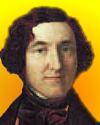
On 11 Aug 1798, Macedonio Melloni died, the Italian physicist who was the first to extensively research infrared radiation. Melloni is yet another of those scientists whose name is likely unfamiliar to you, yet he did significant work. In A Review of the Progress of Mathematical and Physical Science (1858), James David Forbes can acquaint you with Macedonio Melloni and his work on the Transmission and Refraction of Heat.
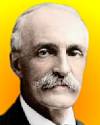
On 11 Aug 1865, Gifford Pinchot was born, the American forester who as the first chief of the U.S. Forest Service popularized the conservation of natural resources. He is regarded as a father of American conservation because of his great and unrelenting concern for the protection of the American forests. His efforts were supported by President Theodore Roosevelt, but not by his successor, President Taft, who replaced Pinchot in Jan 1910.
When Roosevelt died in 1919, Pinchot spoke at the Roosevelt Memorial Meeting, Metropolitan Opera House, Philadelphia. Pinchot's address was contributed to the memorial issue of Natural History magazine. Pinchot had first-hand experience of the President, about their shared goals and values, which you can read in the article, Roosevelt, the Man of Abundant Life. Although the subject of the piece is Theodore Roosevelt, naturally the words also give an insight into the writer, Gifford Pinchot.

On 11 Aug 1865, Gifford Pinchot was born, the founder and first chief of the Forest Service. Today's book pick is: Breaking New Ground, by Gifford Pinchot, who tells a fascinating tale of his efforts, under President Theodore Roosevelt, to wrest the forests from economic special interests and to bring them under management for multiple- and long-range use. His philosophy of “the greatest good for the greatest number over the longest time” has become the foundation upon which this country's conservation policy is based. The courage and vision of the man whose leadership is central to the development of the profession of forestry in the United States is essential reading for anyone interested in understanding the basis of our present national forest policy, and the origins of the conservation movement. This is a special commemorative edition.
It is available from Amazon, typically about New from $53.40. Used from $13.05. (As of earlier time of writing - subject to change.)
| no image | Science is wonderfully equipped to answer the question “How?” but it gets terribly confused when you ask the question “Why?” |
 | I ran into the gigantic and gigantically wasteful lumbering of great Sequoias, many of whose trunks were so huge they had to be blown apart before they could be handled. I resented then, and I still resent, the practice of making vine stakes hardly bigger than walking sticks out of these greatest of living things. |
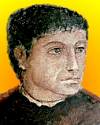 | In every science certain things must be accepted as first principles if the subject matter is to be understood; and these first postulates rest upon faith. |
| Before you look at today's web page, see if you can answer some of these questions about the events that happened on this day. Some of the names are very familiar. Others will likely stump you. Tickle your curiosity with these questions, then check your answers on today's web page. | |
| Births | |
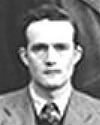 | Tom Kilburn, born 11 Aug 1921, was a British electrical engineer who wrote the computer program used to test the first stored-program computer, the Small-Scale Experimental Machine, SSEM, also known as “The Baby.” It successfully tested a memory system developed at Manchester University in England. This system was the first that could store programs, whereas previous electronic computers had to be rewired to execute each new problem. On what was Kilburn’s memory system based (though soon replaced)? |
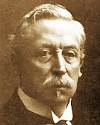 | Christiaan Eijkman, born 11 Aug 1858, was a Dutch scientist, who demonstration that beriberi is caused by poor diet led to the discovery of vitamins. He investigated beriberi in the Dutch East Indies in 1886. Eijkman discovered by accident that a certain change in diet for his laboratory chickens produced a disease resembling beriberi in human beings. Can you tell the story involving the chickens and their rice food that led to this discovery? |
| Deaths | |
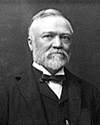 | A Scottish-born U.S. steel industrialist (1835-1919) was a philanthropist, benefactor to education and built over 1700 public libraries. Can you name this industrialist? |
| Events | |
 | On 11 Aug 1909, the liner, Arapahoe, was the first ship to use a new, standard international radio distress call when it found itself in trouble off Cape Hatteras, NC. What was this new distress signal? |
Fast answers for the previous newsletter for August 10: a method of separating chemically similar charged colloids - an electrical field is applied to the sample, and particles with different sizes migrate at different rates to the pole of opposite charge • Monopoly • Robert Goddard • killed in action in World War I • Smithsonian Institution • the century including the year 1675.
 If you enjoy this newsletter, the website, or wish to offer encouragement or ideas, please send feedback by using your mail reader Reply button.
If you enjoy this newsletter, the website, or wish to offer encouragement or ideas, please send feedback by using your mail reader Reply button. Your click on a Facebook, StumbleUpon, or other social button on the site webpages is also a welcome sign of appreciation. Thank you for using them.
© This newsletter is copyright 2020 by todayinsci.com. Please respect the Webmaster's wishes and do not put copies online of the Newsletter — or any Today in Science History webpage. (If you already have done so, please remove them. Thank you.) Offline use in education is encouraged such as a printout on a bulletin board, or projected for classroom viewing. Online, descriptive links to our pages are welcomed, as these will provide a reader with the most recent revisions, additions and/or corrections of a webpage. For any other copyright questions, please contact the Webmaster by using your mail reader Reply button.
--
If you do not want to receive any more newsletters, Unsubscribe
To update your preferences and to unsubscribe visit this link
Executive Real Estate Business Class
-
"It was like a man with wings. It wasn't like anything you'd see on TV or in a monster movie." ...
About the publisher
Search This Blog
Blog Archive
-
▼
2021
(585)
-
▼
August
(32)
- Newsletter for Tuesday 31 August.
- Newsletter for Monday 30 August.
- Newsletter for Sunday 29 August.
- Newsletter for Saturday 28 August.
- Newsletter for Friday 27 August.
- Newsletter for Thursday 26 August.
- Newsletter for Wednesday 25 August.
- Newsletter for Tuesday 24 August.
- Newsletter for Monday 23 August.
- All-New Tonight: 'The Machines That Built America'
- Newsletter for Sunday 22 August.
- Newsletter for Saturday 21 August.
- Newsletter for Friday 20 August.
- Newsletter for Thursday 19 August.
- Newsletter for Wednesday 18 August.
- Newsletter for Tuesday 17 August.
- Newsletter for Monday 16 August.
- Newsletter for Sunday 15 August.
- Newsletter for Saturday 14 August.
- Newsletter for Friday 13 August.
- Newsletter for Wednesday 11 August.
- Newsletter for Tuesday 10 August.
- Newsletter for Monday 9 August.
- All-New Tonight 9/8c: Telephone Wars
- Newsletter for Sunday 8 August.
- Newsletter for Saturday 7 August.
- Newsletter for Friday 6 August.
- Newsletter for Thursday 5 August.
- Newsletter for Wednesday 4 August.
- Newsletter for Tuesday 3 August.
- Newsletter for Monday 2 August.
- Newsletter for Sunday 1 August.
-
▼
August
(32)
-
Blogroll
-
About
HistoryFact










0 comments:
Post a Comment